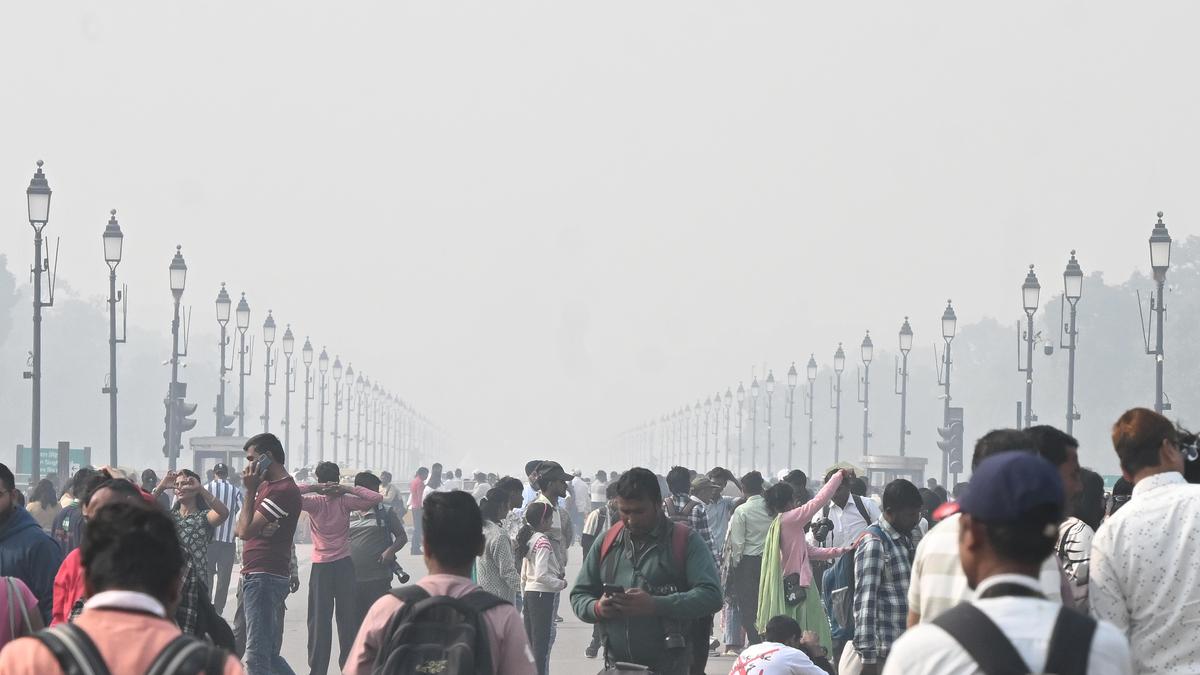Delhiites woke up to ‘very poor’ air on Tuesday (November 18, 2025), with the city’s AQI touching 344 and four stations reporting ‘severe’ pollution levels, the Central Pollution Control Board (CPCB) data showed.
| Photo Credit: Sushil Kumar Verma
The Supreme Court on Wednesday (November 19, 2025) gave the Commission for Air Quality Management (CAQM) a free hand to take “any proactive measure” to curb air pollution throttling Delhi-NCR after the statutory body proposed advancing choice GRAP IV restrictions like work-from-home and 50% office attendance to the ongoing GRAP III stage itself.
“Any proactive measure of CAQM to reduce air pollution is always welcome,” Chief Justice of India B.R. Gavai, heading a Bench comprising Justice K. Vinod Chandran, observed in an order. The court said CAQM must however consult stakeholders and take everyone on board.
The court was responding to a note submitted by the CAQM proposing short-term and long-term measures against air pollution choking Delhi-NCR.
Amicus curiae, senior advocate Aparajita Singh, highlighted a CAQM recommendation to exempt BS-III emission vehicles from the protection of an August 12, 2025 apex court order, which had barred authorities from taking any coercive steps against the owners of 10-year-old diesel and 15-year-old petrol vehicles.

“We have said the CAQM may take any measure. That it would be welcome,” Chief Justice Gavai responded to Ms. Singh.
Staggered office timings in GRAP II
CAQM also proposed including the GRAP III restriction of staggered office timings in GRAP II. The Commission recommended differential rates and augmentation of public transport fleet and metro services, more deployment at traffic congestion spots and synchronisation of traffic movements to be put in place as part of the GRAP I stage. CAQM said NCR States and the Delhi government must expeditiously notify vehicle aggregators’ policies and develop a portal for monitoring them.
The court directed the CAQM to look into the issue of schools conducting sports events in the months of November and December, when pollution was at its peak.
Ms. Singh said such events virtually amount to putting children in a gas chamber. The court made it clear that the CAQM must pass the necessary directions to the States concerned regarding this issue.
As long-term measures, the CAQM proposed a review of the electric vehicle policies and imposition of higher environmental protection charges in luxury diesel cars and SUVs of 2000 cc capacity and above. Currently the environmental cess charged is a paltry 1%.

“The funds collected may be utilised in consultation with the CAQM for abatement for air pollution in NCR,” the note said.
It proposed, as a long-term measure, to not permit any new coal-based thermal power plants to be established within 300 km from Delhi.
Other long-term recommendations by CAQM include the liquidation of legacy waste within a specified timeline; collection, transportation and processing of construction and demolition waste; and redevelopment of roads with adequate green shoulders.
Fill-up vacancies in pollution control boards
The court, in turn, ordered the filling up of vacancies in the pollution control boards and directed steps be taken to pay subsistence allowances to daily-wage labourers, who have been deprived of their livelihood due to the existing GRAP III restrictions.
The Bench observed that the issue of air pollution required regular monitoring by the Supreme Court.
“It will be appropriate that the Supreme Court, rather than rushing through these matters, engages in regular monitoring,” the CJI, who is retiring on November 23, observed.
The court scheduled the next hearing for December 10.
Published – November 19, 2025 03:54 pm IST

